Alan Baxter's Blog, page 75
November 24, 2011
Interview at the Tara Sharp site
The wonderful Kylie Fox interviewed me recently for the Tara Sharp site. We talked about what I'm working on, my future publications and how a lot of my stuff has crime or mystery tropes at its core.
Check it out here: http://www.tarasharp.com/author-in-focus-alan-baxter/
.
November 23, 2011
RIP Anne McCaffrey, Vale Dragonlady
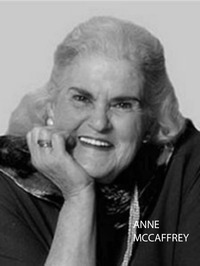 When I got up this morning I was checking through the social networks over breakfast and saw from Trent Zelazny's Facebook page that Anne McCaffrey had died of a stroke yesterday. It hit me like a speeding a truck and a small part of my childhood died too. To say that Anne McCaffrey was instrumental in the person and writer I have grown up to be would be an understatement. I immediately put my condolences out through Twitter only to realise that the news hadn't spread yet. I'm usually a bit behind on this stuff, but suddenly I found myself being the first person people had heard the news from. It was an unusual experience for me, but a profoundly touching one as I saw the massive heartache that Anne's passing caused, saw so many other people as deeply affected as I was.
When I got up this morning I was checking through the social networks over breakfast and saw from Trent Zelazny's Facebook page that Anne McCaffrey had died of a stroke yesterday. It hit me like a speeding a truck and a small part of my childhood died too. To say that Anne McCaffrey was instrumental in the person and writer I have grown up to be would be an understatement. I immediately put my condolences out through Twitter only to realise that the news hadn't spread yet. I'm usually a bit behind on this stuff, but suddenly I found myself being the first person people had heard the news from. It was an unusual experience for me, but a profoundly touching one as I saw the massive heartache that Anne's passing caused, saw so many other people as deeply affected as I was.
I discovered McCaffrey's Dragonriders of Pern books when I was a child, maybe ten or eleven years old. Already a voracious reader, I was always on the lookout for the next great story. McCaffrey's books transported me. When I realised there were several of them, I couldn't believe my luck. I felt like a prospector striking gold. Always a fan of dragons, here were books that made dragons into something nobler and more beautiful than I could have imagined. Here was a world so rich in detail and populated with such wonderful characters that I truly wished I could slip between and go there. If someone had offered me a one way ticket to Pern, I wouldn't have thought twice about it.
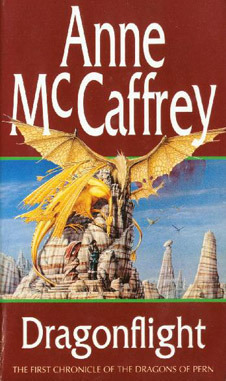 At about 12 years of age, I wrote my first ever fan letter to an author. I needed to tell this lady how much her books meant to me, how wonderful they were. In the back of one book I saw a note, with an address for any correspondence. I found it hard to believe that such a thing was possible, but I sat down and wrote my letter and asked my mum to post it off. Weeks passed. Weeks are a long time for a twelve-year-old and I thought, Oh well, it was worth a try. It was no surprise that someone as magical as Anne McCaffrey wouldn't have time to write to some precocious kid in England.
At about 12 years of age, I wrote my first ever fan letter to an author. I needed to tell this lady how much her books meant to me, how wonderful they were. In the back of one book I saw a note, with an address for any correspondence. I found it hard to believe that such a thing was possible, but I sat down and wrote my letter and asked my mum to post it off. Weeks passed. Weeks are a long time for a twelve-year-old and I thought, Oh well, it was worth a try. It was no surprise that someone as magical as Anne McCaffrey wouldn't have time to write to some precocious kid in England.
Then a postcard arrived. It had dragons on the front. On the back was a handwritten response from Anne McCaffrey, telling me how pleased she was that I'd enjoyed her books, and how much she appreciated my letter. I was stunned. In my letter I'd told her how I wanted to be a writer one day too, and that I hoped I could maybe write books as good as hers. In her reply she said, "Don't ever let anyone tell you that you can't." That still resonates with me to this day. I do write books now, and maybe one day they'll be as good as Anne McCaffrey's.
I wish I could find that postcard. I kept it safe, but it was close to thirty years ago and I've moved many times since then, to the other side of the planet. If I ever find it, I'll scan it and post it here. Regardless, it lives on my memory as one of the most important things I've ever owned. It shaped me as much as her stories did.
Anne McCaffrey was a class act. An absolute legend who touched the lives of millions. It's a world worse off without her in it, but we'll have her stories forever. When I read the news over breakfast this morning, it was raining heavily. I sat at the table, staring out the window at the lancing rain and thought about the thread. I imagined riding a dragon out to burn the thread before it could harm the people below. I remembered just how magical those stories of dragons and guilds were. And all her other stories too, the Crystal universe and Ireta, Talents and Freedom, and so many more. Vale, Anne McCaffrey. If you listen really hard, you can hear the dragons keening.
.
November 22, 2011
Thrillercast episode 32 – Sorting Out The Civil War in Publishing
 The latest episode of Thrillercast is out – Sorting Out The Civil War In Publishing. In this latest podcast, David Wood and I talk about the rise of evangelism on both sides of publishing – those advocating self-publishing as the only viable route, and those who think traditional publishing is the only acceptable path. And we discuss how we're thoroughly sick and tired of both forms of extremism.
The latest episode of Thrillercast is out – Sorting Out The Civil War In Publishing. In this latest podcast, David Wood and I talk about the rise of evangelism on both sides of publishing – those advocating self-publishing as the only viable route, and those who think traditional publishing is the only acceptable path. And we discuss how we're thoroughly sick and tired of both forms of extremism.
Listen, enjoy and share – Episode 32 – Sorting Out The Civil War in Publishing
.
November 16, 2011
Writers as bitches and the investment of readers
Back in May 2009 a reader asked Neil Gaiman, via his blog, whether it was reasonable to feel let down that George R R Martin was not giving any clues about the release of the next A Song Of Fire & Ice installment. Gaiman famously told that reader, "George R R Martin is not your bitch".
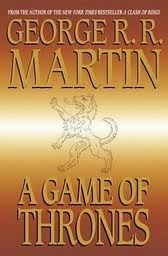 GRRM is one of the best and most popular fantasy writers, but his A Song Of Ice & Fire series, which started in 1996, has been a long time to completion, and isn't finished yet. At the end of book 4 it said to expect book 5 in a year. It took six years to see publication. There are still two more books to come, with no release date even hinted at. So people are getting concerned that the whole story may never be told, and the query posted to Neil Gaiman is still valid. As, potentially, is Gaiman's answer.
GRRM is one of the best and most popular fantasy writers, but his A Song Of Ice & Fire series, which started in 1996, has been a long time to completion, and isn't finished yet. At the end of book 4 it said to expect book 5 in a year. It took six years to see publication. There are still two more books to come, with no release date even hinted at. So people are getting concerned that the whole story may never be told, and the query posted to Neil Gaiman is still valid. As, potentially, is Gaiman's answer.
Gaiman's point is that GRRM doesn't have to live up to our (readers) expectations. As a writer, I can kind of agree with that to an extent. Gaiman posits that the reader, by buying the first book, assumed some kind of contract with Martin. Gaiman says, "No such contract existed. You were paying your ten dollars for the book you were reading, and I assume that you enjoyed it because you want to know what happens next."
Art is not something you can force, and Martin is well within his rights to do whatever he wants with his story. Even quit now and never finish. He's not our bitch and that's his prerogative. However, if he does do that, I think he is also letting his readers down. And not just GRRM – this applies to all of us as writers. If we've said we'll do one thing and we do something else, that's either our choice or a situation forced upon us. But we are letting people down when we do it. It's not an either/or proposition.
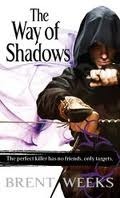 Recently, Brent Weeks, author of the Night Angel Trilogy and The Black Prism, posted an opinion piece at SciFiNow in which he says that Gaiman is wrong. In the article, Weeks says:
Recently, Brent Weeks, author of the Night Angel Trilogy and The Black Prism, posted an opinion piece at SciFiNow in which he says that Gaiman is wrong. In the article, Weeks says:
"Part of what entices us to buy a book is the promise conveyed in the title. "Gragnar's Epic Magical Dragon Quest Trilogy: Book 1" promises there will be two more books. Whether through the title, or interviews, or through a note to readers at the end of a book that says the next book will be out in a year, when an author makes that kind of commitment, maybe technically there's no contract, but there is an obligation."
He also says, "…writers make mistakes about how fast they're going to finish books All The Time. GRRM's situation is merely illustrative." This is well worth bearing in mind, as I'm not out to bash GRRM here, or anyone else in particular. I'm simply addressing the issue as a whole.
But I think Weeks is right – there is an obligation there. When a writer says they'll write X number of books, readers start to invest their time and money into that series. It's quite reasonable to feel cheated when the author doesn't come through on that promise. For this reason a lot of people are now loathe to buy into a series until they know it's finished. After all, they don't want to spend time and money getting into a story without an end. Which is fairly reasonable. I'm tempted to make a sexual metaphor here, about encounters without happy endings, but I'll be a grown-up and rise above that temptation.
I wrote a piece a while back called While you wait for book three, authors die! in which I point out that this method can be damaging. If an author's first book doesn't sell well, their publisher may decide to cut their losses and not publish the rest of the series. Bad for readers and writers. I always advise buying the first book, but not reading it yet. Collect the whole series as it comes out and read it all once it's finished. Of course, this could turn out to be a waste of your hard-earned if the author doesn't finish the series. But life without risk is like an untoasted tea cake. There's no crunch.
Readers and authors are entering into unwritten contracts with each other. The author says, "I'll write this series." The reader says, "Cool, I'll buy it and read it. I might even like it and give you a positive review and tell my friends about it." It's a symbiotic relationship.
The author doesn't have to finish that series. There's no legally binding contract, no demon's blood on the page to force the magic out. But, should they not see through that originally stated obligation, they are letting the readers down. We all fuck up sometimes, we all get distracted by life and things that happen which are beyond our control. We all let people down sometimes, however much we may wish and try not to. But we should also own up to that let down. "Sorry, folks, I let you down" is lot more conducive to an ongoing relationship than, "Fuck you, I'm not your bitch!"
I really want GRRM to finish A Song Of Ice & Fire. I've invested a lot of time and money into it and I really want to know how it all works out. But Martin isn't my bitch and I can't force him to do something that he may not have the ability (due to other things in his life) or inclination to do. But, should the series not be wrapped up, I will feel let down.
How do you feel about it?
.
November 14, 2011
The Courier's New Bicycle by Kim Westwood – review
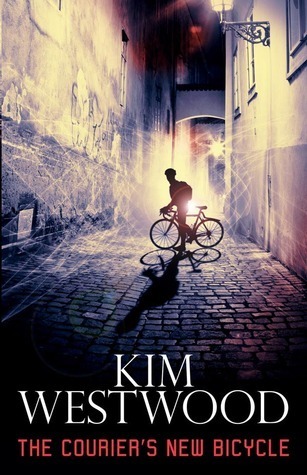 Kim Westwood is a writer with a rare, light touch. The Courier's New Bicycle is her second novel. I haven't read her first, The Daughters of Moab, so this is my first foray into Westwood's long fiction, though I have enjoyed her short stories in the past.
Kim Westwood is a writer with a rare, light touch. The Courier's New Bicycle is her second novel. I haven't read her first, The Daughters of Moab, so this is my first foray into Westwood's long fiction, though I have enjoyed her short stories in the past.
This book is the story of gender transgressive, Salibury Forth, and his/her life as a courier of contraband hormones in a dystopian near-future Melbourne. A pandemic has cause widespread decay among society due to its effect of making a large proportion of the population sterile. The governing authorities are religious zealots and the world is not a very pleasant place any more.
I won't go into any more detail about the story here, as it's easily learned elsewhere. However, it's fundamentally a noir-ish whodunnit, with people double-crossing other people, trouble on the streets, and Salisbury trying to sort it all out. Salisbury is also an activist, working with a clandestine group to free animals from the cruelty of factory hormone farming. So Westwood tackles big issues here – gender, religious oppression, cruel farming practices, activism. It would be easy for the book to become a diatribe, a lecture, but it doesn't.
I have to admit that at first I thought the book wasn't going to work for me. But I soon locked into Westwood's light, lyrical style and it all started to gel. She deals with very heavy subjects with a nuanced touch and lets characters speak for themselves. The mystery is convoluted and, at times, a bit opaque, but gripping nonetheless. The world she creates is very well realised, and not a place I would ever want to live. This story turned out to be transportive.
One of things I enjoyed the most is Salisbury's connection with her bicycle in a world where petrol engines are virtually extinct, and the freedom that bicycle gives to Salisbury, who is otherwise very trapped by her world, her sexuality, her relationships and everything else (I'm saying "her" for ease of writing – you can read the book and decide for yourself!) I'm a keen motorcyclist and I understand the freedom of the open road. Westwood's descriptions of Salisbury's body and bike working as one are brilliant.
The story is tightly plotted and the world immersive. I read this book over a weekend and thoroughly enjoyed it. It's not action-packed and in your face science fiction. In fact, in the Acknowledgments, Westwood says:
This story pays homage the many groups that work against the cruelty of the bile and factory farming industries, including those tireless champions of the animals, the Voiceless team, and Animals Asia. This story is also for gender explorers everywhere: not fantasy. Not science fiction.
The Courier's New Bicycle is a tremendous achievement.
.
November 13, 2011
Movember 2011
I'm a bit late getting around to posting an update about this, but things have been hectic. Anyway, it's only halfway through, so I figure it's all good. I'm growing a moustache for Movember.
It's a very good cause:
During November each year, Movember is responsible for the sprouting of moustaches on thousands of men's faces in Australia and around the world. The aim of which is to raise vital funds and awareness for men's health, specifically prostate cancer and depression in men.
If you'd like to donate, and I urge you to do so if you can spare a few bucks, you can do so here: http://mobro.co/AlanBaxter
For the purposes of transparency, I'll post my photos so far below. Starting photo, clean shaven on November 1, then the one week and two week progress photos.
Ridiculous, really, but ridiculous fun for a good cause.

Week 0

Week 1

Week 2
.
November 8, 2011
John Joseph Adams Buys Lightspeed and Fantasy
I read this at Locus Online today:
John Joseph Adams, editor of Fantasy and Lightspeed, has purchased both magazines from Prime books. Adams will become the official publisher in January 2012. He took over as editor for Fantasy magazine earlier this year, and has edited Lightspeed since its June 2010 debut. Fantasy magazine was established in 2005, and has been nominated for the Hugo Award; stories from both Fantasy and Lightspeed have been nominated for the Hugo, the Nebula Award, the World Fantasy Award, and the Theodore Sturgeon Award, among others.
These are great online zines, with excellent pay rates for authors. Definitely the future of fiction magazines, it's great to see these two in such good hands. Long may they reign. Full press release via S F Signal here.
.
November 6, 2011
Midnight Echo 6 interview and excerpt
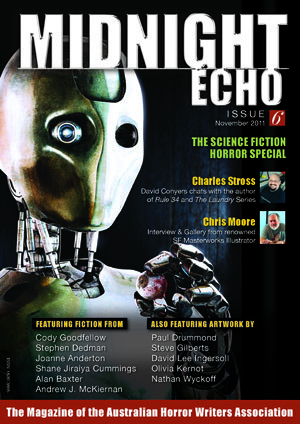 I'm very proud that my short story, Trawling The Void, is going to be published in Midnight Echo, #6. For one thing, Midnight Echo is one of Australia's premier fiction magazines, and the official magazine of the Australian Horror Writers' Association. Issue 6 is a sci-fi horror special, and while I usually write dark fiction and dark contemporary fantasy stuff, every once in a while I foray into straight fantasy or sci-fi. Trawling The Void is one of my infrequent sci-fi outings.
I'm very proud that my short story, Trawling The Void, is going to be published in Midnight Echo, #6. For one thing, Midnight Echo is one of Australia's premier fiction magazines, and the official magazine of the Australian Horror Writers' Association. Issue 6 is a sci-fi horror special, and while I usually write dark fiction and dark contemporary fantasy stuff, every once in a while I foray into straight fantasy or sci-fi. Trawling The Void is one of my infrequent sci-fi outings.
It's going to be a great issue, with a solid collection of stories. You can get it in print or electronic format when it's released soon. All the details here.
In the meantime, David Conyers, one of the co-editors of this issue, asked me a few questions about the story recently and you can find that short interview and an excerpt from Trawling The Void here on David's blog.
.
November 3, 2011
The story of a story, or how I was flensed
 flense
flense
verb, flensed, flens·ing
1. to strip the blubber or the skin from (a whale, seal, etc.).
2. to strip off (blubber or skin).
Beware – Harsh truth approaching: We are not good enough.
None of us are good enough. Sure we can get good. Good enough to be published. We can continually get better, assuming we have that desire and constantly work at our craft. Which we all should, of course. But, on our own, in our little bubbles of imagination and twisted ideas, we're not good enough. We need to be better than we're capable of being on our own. For that, we need the unbiased, critical eyes of others.
As a writer, I work alone. It's part of the job and it's one of the things I love about it. I also love the community of writers I've gathered around myself over the years, online and in real life. And therein lies the key. I have a handful of talented writer friends who are happy to read and critique my work. I'm happy to return the favour. It's how our world goes around. I'm actually very lucky in that the majority of writerly friends happy to critique my work are far better scribes than I.
As the writer of a story (or novel, screenplay, webserial, whatever) we're far too close to the thing to be objective. We've invested our time, imagination and effort into creating it. We've extruded the guts of it from the labyrinthine depths of our subconscious and regurgitated it into being. Up to a point we can be critical of our own work. We can put the first draft away for a while to let it fester, then pull it out again and read it with fresh eyes. The longer you've been doing this, the better you get at spotting flaws and being honest with yourself. We can turn a first draft into a pretty decent final draft. But we're still not objective enough and it's not really a final draft at all.
I wrote a short story recently that I was really pleased with. I spent a while going over it, polishing it, getting it just right. I sent it out into the world. And it came back. And again. And again. The rejections stacked up. It's cool, I'm used to that. Every writer is. We have hides that make rhino skin look like tissue paper and a solid fuck-you-attitude that keeps us working in the face of constant rejection. It's the only way to work in this game. After all, it's not necessarily the story – it could be the editor just doesn't dig that vibe, or the publication ran something a bit similar recently, or the publisher's cat swallowed a bee and she's sore at the world and takes it out on a good story. That last one is unlikely, but anything's possible.
But once something has been bounced a few times in a row, you can start to see the common denominator. It's the story, schmuck. It ain't good enough.
So I went to my friends seeking help. In this particular instance I was fortunate enough to get the Evil Drs Brain* on the case. Given that it was a dark and twisted fairy tale vibe, I asked Angela Slatter* to have a look at it for me. She read the story, liked it, but took her flensing knife to it with abandon. I got it back and sobbed quietly for a few minutes, then manned up and listened to her advice. It was good advice. She'd seen flaws I hadn't, picked up things in the story that needed to work differently. She'd identified character inconsistencies I would never have seen.
The story was greatly improved, but it still needed something; we could both see that now. Angela sent it over to her other brain, Lisa L Hannett*. Lisa added her flensing knife to the mix and my story was further eviscerated, but she saw the things that needed fixing.
One of them was really harsh – the whole story had grown from a killer closing line. I came up with the final line, something I really wanted to use to finish, and the whole story grew out of that. Lisa pointed out that the final line didn't work. The story had outgrown its seed of conception and that line had to go.
I wailed and raged, but I knew Lisa was right. The line was cut. I killed the fuck out that particular darling. There's no room for pussies in this caper.
The story has just been sold to a very prestigious market and I couldn't be happier.
The moral of the story? We need our friends. We need beta-readers, critiques, flensing knives flashing in the cold light of dawn. And we must listen to these people.
Hopefully it gets to the point where our writing is good enough that we can usually get something to a standard editors want to buy and then they do that last bit of flense and polish. A good editor will see the gem in the rough diamond and draw it out. But they don't have time for much. It behoves us to make our work shine as brightly as it possibly can.
In essence: fresh eyes, beta readers, honest critique, listen to advice and kill your darlings. You know, the usual shit. It's been said before, and it will be said again. But it needs to be repeated.
Say it after me:
We are not good enough.
We must try harder,
All the time.
And help our friends as they help us.
For this is the flensing,
And the power of the story,
For ever and ever.
RAmen. (Quick and easy, the snack of the starving, jobbing penmonkey.)
Now, go write.
* CAVEAT: Angela and Lisa were happy for me to mention them in this post and applaud their shining word razors, but they won't critique your work. This particular flensing was done on the basis of friendship and collegiality, built up over time. You can, however, get your own friends on the case. Join writers' groups and crit circles and help each other. You'll all grow and improve together. Just get involved and know that you need help and that you can help others. Meet people, be nice, take advice. It all grows from there.
.
October 31, 2011
NaNoWriMo and why I don't
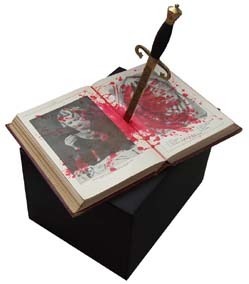 NaNoWriMo is National Novel Writing Month. I'm going to rant a bit here, because I'm pretty much against it in every way. However, and I'll say this again at the end because it won't sink in with the converts, if it works for you, more power to your elbow. But what is it really working?
NaNoWriMo is National Novel Writing Month. I'm going to rant a bit here, because I'm pretty much against it in every way. However, and I'll say this again at the end because it won't sink in with the converts, if it works for you, more power to your elbow. But what is it really working?
The principle is simple enough – for the entire month of November, you write and try to get down 50,000 words in 30 days. That's 1,666 words a day on average. Any old words will do – if you get 50,000 or more, you "win". What do you win? Well, probably several weeks or months of editing at best.
From the NaNoWriMo website we get these gems:
National Novel Writing Month is a fun, seat-of-your-pants approach to novel writing… The goal is to write a 50,000 word, (approximately 175 page) novel by 11:59:59, November 30.
First point of order – 50,000 words is not a novel. It might be a children's or very young adult novel, but even then, not really. Most young adult novels are between 50,000 and 60,000 words. Most adult novels are over 80,000 words. The vast majority of publishers will not accept a novel of less than 80,000 words.
Then there's this one:
Because of the limited writing window, the ONLY thing that matters in NaNoWriMo is output. It's all about quantity, not quality. This approach forces you to lower your expectations, take risks, and write on the fly.
Quality doesn't matter. Lower your expectations. These are never things we should apply to our writing. EVER. The whole concept of NaNoWriMo seems to be to churn out 50,000 words of shit, just to call yourself a winner, and then try to knock it into some kind of shape afterwards.
Why not just aim for 20,000 good words throughout November? Then again in December, January, Feb and March. Then you have an actual first draft novel. And a far better one than you'd achieve using the NaNo model. You won't have to lower your expectations and take quantity over quality. And you know what you've done as well? You've become a writer. You had a goal to write a novel and you did it. Not a goal to vomit up 50,000 words no matter what in a month and call it a win.
What do you win? Nothing, except a feeling of disappointment and an unfinished novel.
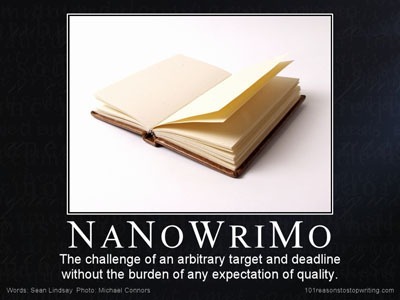
Talking about previous participants, the site says:
They started the month as auto mechanics, out-of-work actors, and middle school English teachers. They walked away novelists.
No. Just no. They didn't. They may very well be novelists one day, but churning out 50,000 words of shite in a month does not a novelist make.
So yes, I'm being especially harsh. It's hard to write a novel, trust me, I know. It's a fucking chore to find writing time, to force that thing in your head out on to paper (or screen, more accurately). Sometimes it's like trying to crap a watermelon out of your face. I get it, I really do. And I can see why some people appreciate the drive of NaNo to force them into a deeper writing zone.
A lot of great novels have grown out of NaNo projects. A lot of people take great strength from the whole NaNo community and the shared support and encouragement. Writing can be a lonely pursuit. I think most writers actually like that – I know I do – but we all crave community. I have many friends in the writing world and we do support and encourage each other. All the time, not just during November.
Any writer can achieve that. You start writing, you join some online forums, you join your local writers' centre and start making friends. Join a crit group. Toughen up and listen to advice. Take any favours you can and offer your help to others in response. Before long you're a writer with a writing community around you. That's how we've all done it.
I can't help thinking about all those would-be writers who get all excited for NaNo, shit out 50,000 words and then live the rest of the year in a mire of inactivity because they were ruined by the NaNo experience. Or all those who don't "win" and then just have something else to beat themselves up about instead of writing.
It's simple – writers write. Not every day necessarily, because everyone has a life, even full-time writers. But just write. Don't mug yourself with perceived wordcounts, or pointless goals. No one wins or loses. We all write, hopefully we get published, and we keep trying to get better and get more published. Lots of little victories among hundreds of failures, but the determined and thick-skinned among us power on through sheer bloody-mindedness.
Here's my advice. Fuck NaNoWriMo. Set yourself a new goal, a far simpler one. Here it is:
I will be a writer.
Simple as that. You write whenever and as often as you can. You keep writing whether you get down 1,666 words in a day or 6. Or 6,000. Fuck it, it doesn't matter. Find the broader writing community and become a part of it, we're happy to have you. And keep doing it. However fast or slow you write, just write. Finish a novel. An actual novel, not 50,000 words of drivel that might be 20,000 decent words when edited that might be part of a novel one day. Then keep going and write some more.
I see NaNoWriMo as a circus of short-term back-slapping and pointless goals, far removed from what's really needed to be a writer. But, and here it comes again for the NaNo fans – if it works for you, go for it! I hope you get inspired, churn out 50,000 or more fabulous words and end up with the start of a novel that you go on to finish and get published. I hope it hits the bestseller lists and makes you rich and famous. I really do. But you know what? It'll take more than 30 days. I'm just saying.
I'll be over here, growing a moustache for Movember.
.




